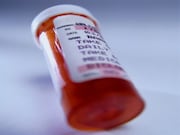UROPP reduces opioids prescribed after gynecologic, abdominal surgery without negative effects
FRIDAY, Dec. 7, 2018 (HealthDay News) — An ultrarestrictive opioid prescription protocol (UROPP) can reduce the number of opioids prescribed to patients after gynecologic and abdominal surgery without negative health consequences, according to a study published online Dec. 7 in JAMA Network Open.
Jaron Mark, M.D., from the Roswell Park Comprehensive Cancer Center in Buffalo, New York, and colleagues conducted a case-control study using a UROPP involving patients undergoing gynecologic oncology surgery.
The researchers found that the mean number of opioid tablets given at discharge after a laparotomy was 43.6 and 12.1 before and after implementation of the UROPP, respectively. The mean number of opioid tablets given at discharge was 38.4 versus 1.3 and 13.9 versus 0.2 before and after UROPP implementation for patients undergoing laparoscopic or robotic surgery and for patients undergoing ambulatory surgery, respectively. For all opioid-naive patients, the mean perioperative oral morphine equivalent dose was reduced to 64.3 mg from 339.4 mg the year prior. There was no increase in the number of refill requests, the mean postoperative visit pain scores, or number of complications in association with the significant reduction in the number of dispensed opioids.
“Using UROPP to manage postsurgical pain after discharge did not result in any negative health consequences; thus, we advocate for adopting radical opioid-sparing approaches for managing postoperative pain nationwide,” the authors write.
Copyright © 2018 HealthDay. All rights reserved.








